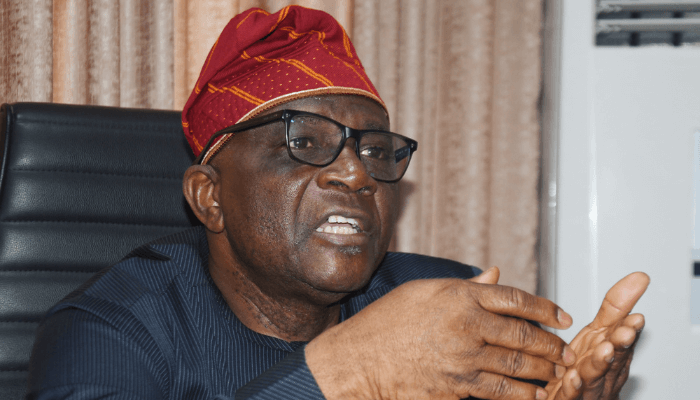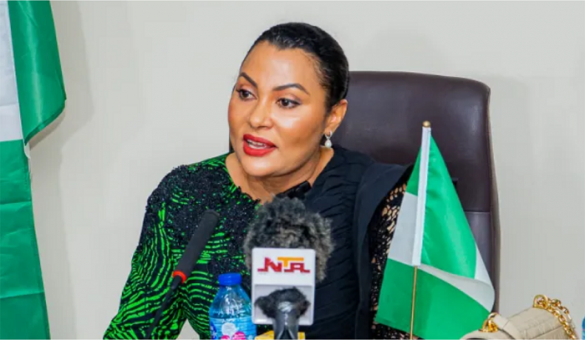Minister of finance and coordinating minister of the economy, Wale Edun has described the proposed minimum wage demanded by the labour unions as unachievable across the board.
The minister said this when he spoke on Sunday during Channels Television’s ‘Sunday Politics’ programme.
Theliberationnews reports that Nigeria Labour Congress (NLC) and the Trade Union Congress (TUC) had stood their ground on the proposed N615,500 as the minimum wage that the federal government should pay Nigerian workers, owing to the the high cost of living.
The groups, had on May 31, declared an indefinite strike, expected to commence on June 3, over the federal government’s refusal to increase the minimum wage from a proposed N60,000.
However, Edun said the labour union has to consider the affordability of the proposed minimum wage for states and local governments as well as the private sector.
He said by law, the government is mandated to set a new wage scale every five years.
According to the minister, it is noteworthy that “it is a minimum wage, it is not a wage”.
“You are not setting a wage for federal government workers, for example. You’re setting a minimum figure that states, local governments, private sector, small businesses must pay, to the extent that they have the requisite number of workers,” Edun said.
“There can still be small scale businesses; they would have to pay that and it is a fixed figure, not a scale.
“So, there are elements of how we have set the minimum wage in the past, particularly what they call the consequential adjustments, which, given what labour is asking for today, would be unaffordable across the board.”
The minister said focus must be placed on the fact that once the minimum wage is enshrined in law, “everybody that falls into the category of having to pay the minimum wage must pay it”.
“And so therefore, the affordability has to be taken into account. And also, we probably have to also take into account the fact that there are other ways of buffeting and supporting the cost of living of workers, other than that particular wage scale,” Edun said.
Edun said with goodwill from all sides, the country would reach a conclusion that is beneficial to Nigerians and the economy.
He also, said “One of the major drawbacks one of the major impediments for them (exiting multinationals) was they did not have a liquid foreign exchange market.
“Now, we have a willing buyer, willing seller foreign exchange market. It is elevated, may be not at the levels we will like it to be but it is when you get inflation down that you can stabilise the exchange rate and even get it coming down similarly with the interest rate. That fight is on. It is an improved environment for them, for big investors as a whole.”
He said recent executive orders signed by President Bola Tinubu has improved the investment climate for gas which Nigeria has in abundance.
The minister said, “Companies will always come and go, of course, our aim is to not only keep them but to have them even more coming to invest, and we are sure that with the environment that we put in place, they would come.”
He said a proposal to make things easier for both local and foreign manufacturers operating in the country are in an Economic Stabilisation Package before the President.
“We are in a difficult place but the direction of travel is and it’s towards improvement. So, every single day, every single month, we are looking at an improved economic situation for Nigeria.”
As Nigeria battles its current economic crisis sparked by the government’s twin policies of petrol subsidy removal and unification of forex windows, some manufacturing companies have exited the country in the last few months, the latest being manufacturers of Huggies and Kotex brands of diapers, Kimberly-Clark.
Others multinationals who exited Nigeria in the last one year are US-based Procter and Gamble (P&G), GlaxoSmithKline (GSK), Unilever, Sanofi-Aventi Nigeria, amongst others.
Some similar reasons given by the companies include high energy cost and currency depreciation.
Speaking further Wale said the Economic Stabilisation Plan which is currently before President Bola Tinubu will address the challenges of businesses in the country. “Help will be given to farmers, and consumers.
There is also help for small businesses, medium-sized scale businesses. There is also on Mr President’s table, shortly by Monday, the economic stabilisation plan that deals with the factors that are affecting big business, industry,” he said.
But the minister is giving an assurance that the current administration is working to reduce the inflation rate in the country.
“What we can look forward to in the weeks and months to come is an improvement in the situation. We can expect that food prices will come down, food availability will increase.
“That is the commitment and focus of government. Not only have we put in place a very robust and transparent system for paying people directly, we are also looking at looking at food availability,” he stated.














